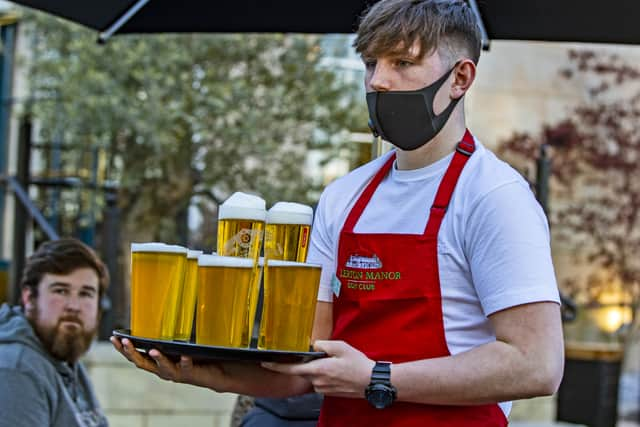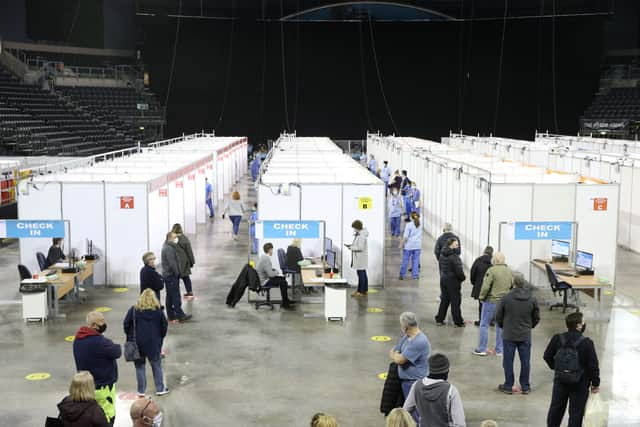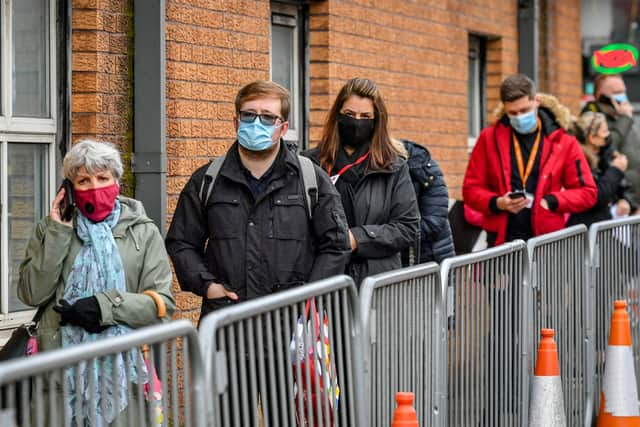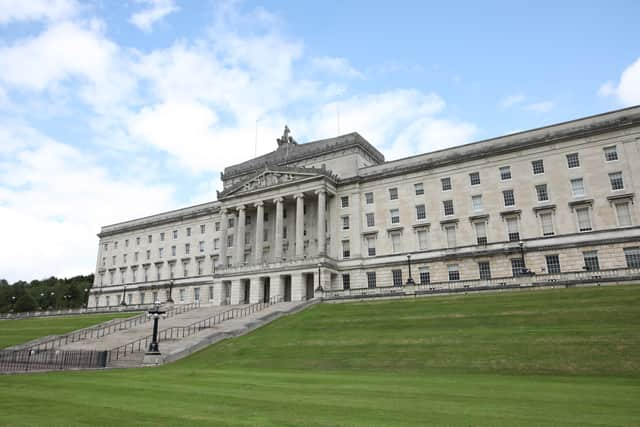Disappointment as four hour meeting of NI Executive rejects reopening indoor hospitality at same time as England and Scotland
and live on Freeview channel 276
Scroll down for more on this story.
LIVE UPDATES: Coronavirus NI - Disappointment as four hour meeting of NI Executive rejects reopening indoor hospitality at same time as England and Scotland
Disappointment as four hour meeting of NI Executive rejects reopening indoor hospitality at same time as England and Scotland


On Monday you will be able to legally drink a pint of beer or enjoy a meal in a restaurant in England and Scotland but not Northern Ireland.
There was hope on Thursday morning that the Northern Ireland Executive would move to bring forward the reopening of indoor hospitality from May 24 to 17.
However, according to Stormont sources the Executive decided against this and instead stuck rigidly to its indicative date of May 24.
Stormont sources have told us that there is a proposal on the table that would permit up to 1,000 spectators attend the Irish Cup final on Friday May 21, 2021.
The indicative date of May 24 remains in place and has been earmarked as the date when indoor hospitality can reopen but only with mitigations in place.
Libraries and outdoor gatherings of up to 500 people will also be permitted to reopen on May 24.
The Executive has still yet to sign off on a list of countries people living in Northern Ireland will be able to visit this summer without having to self-isolate when they return.
May 24 is also the date the Executive said it hopes to lift travel restrictions between Northern Ireland and mainland Britain and Northern Ireland and the Republic of Ireland.
New cases of Indian variant detected in Northern Ireland


Health authorities on both sides of the border have detected new cases of B1.617.2 (Indian variant).
The Indian strain of Covid-19 is spreading fast in Great Britain with some experts suggesting it 2.6 times more infectious than the original virus and 60 per cent more infectious than the Kent variant.
The Public Health Agency (PHA) confirmed seven cases had been detected in Northern Ireland up to May 5 however it is believed at least five more cases have been detected since that date.
The Indian variant is of concern to the government in Westminister with some government ministers suggesting it could affect the plan to scrap all Covid-19 restrictions by June 21.
The PHA has yet to confirm the exact number of confirmed cases of the Indian variant in Northern Ireland.
The PHA is also refusing to say where in Northern Ireland the cases have been detected and will not say if any of the people to test positive for the strain had received a Covid-19 vaccine or if they had tested positive for Covid-19 before.
Emergency meeting to discuss Indian variant called by Sage as lockdown easing comes under threat


The Government is “anxious” about the Indian variant of concern and is “ruling nothing out”, although England’s road map still looks on track, Boris Johnson has said - writes Jane Kirby and Tom Wilkinson, PA.
Scientists are keeping a close eye on the spread of the variant across the UK, with new figures from Public Health England (PHE) on Thursday expected to show a big rise in cases.
Speaking at a primary school in Ferryhill, County Durham, the Prime Minister said: “It is a variant of concern, we are anxious about it.
“At the moment there is a very wide range of scientific opinion about what could happen.
“We want to make sure we take all the prudential, cautious steps now that we could take, so there are meetings going on today to consider exactly what we need to do.
“There is a range of things we could do, we are ruling nothing out.”
The Scientific Advisory Group for Emergencies (Sage) is holding a meeting on Thursday to discuss the spread of the Indian variant, amid fears it could have an impact on the Government’s road map out of lockdown.
Asked if local lockdowns were possible, Mr Johnson said: “There are a range of things we could do, we want to make sure we grip it.
“Obviously there’s surge testing, there’s surge tracing.
“If we have to do other things, then of course the public would want us to rule nothing out.
“We have always been clear we would be led by the data.
“At the moment, I can see nothing that dissuades me from thinking we will be able to go ahead on Monday and indeed on June 21 everywhere, but there may be things we have to do locally and we will not hesitate to do them if that is the advice we get.”
Asked if masks and social distancing would be scrapped, Mr Johnson said more announcements would be made before the end of the month.
He added: “I think we have to wait a little bit longer to see how the data is looking but I am cautiously optimistic about that and provided this Indian variant doesn’t take off in the way some people fear, I think certainly things could get back much, much closer to normality.”
Downing Street also said officials would not “rule anything out” when asked if the Government was considering surge vaccinations to accompany surge testing in areas with spikes of new variants.
The Prime Minister’s official spokesman told a Westminster briefing: “We want to consider all options.
“The meeting is happening with Sage today and should they come out with any further updates on this variant originating in India and the epidemiology in the UK then we will consider it.”
Earlier, Professor Steven Riley, from Imperial College London, said whether the road map for England continued on its planned trajectory was “a Government decision” but suggested the UK was currently in a good place.
He told Times Radio: “I think there’s two key things that have got to be kind of evaluated – if infections go up, how quickly will they go up? But then after that, are they linked to the hospitalisations?
“The top-line Government policy is driven by protecting the NHS, so even if infection starts to go up, we then need to assess whether that’s bringing a lot of new cases into hospitals, and there’s certainly no sign of that at the moment.”
On Wednesday, the European Medicines Agency said it was “pretty confident” that vaccines currently in use would be effective against the Indian variant – a view echoed by some British scientists.
Three types of the Indian variant have been identified in the UK, one of which is a variant of concern.
But Professor James Naismith, from the University of Oxford, said not enough was known to say for sure whether the variant could frustrate the UK’s vaccination programme.
“The vaccines don’t 100% prevent infection for people,” he told BBC Radio 4’s Today programme.
“What they do is, they almost 100% prevent hospitalisation and serious illness.
“We don’t know enough to know yet whether the Indian strain will behave differently than that.
“So even the regular virus can infect people who have been vaccinated and sometimes you do get reinfection.”
Prof Naismith said the variant may spread “way beyond” the local areas where it has been detected, suggesting much wider community transmission of the variant.
“I think we should view it as a countrywide problem,” he said.
“It will get everywhere. We keep learning this lesson, but we know that this will be the case.”
Prof Naismith said he did not believe local restrictions would work to contain the variant, adding: “When we tried locally having different restrictions in different regions that didn’t really make any difference.
“So I don’t think thinking about a localised strategy for containment will really work.”
Elsewhere, Professor Adam Finn, from the University of Bristol and a member of the Joint Committee on Vaccination and Immunisation (JCVI), suggested there was no firm plan for vaccinating teenagers and younger children.
He told BBC Breakfast: “We’ve not really had any discussions yet about immunising teenagers or indeed younger children.
“We don’t have any vaccines authorised for those age groups at the moment.
“But I think it’s also an open question as to whether or not we really will need to do that at this point and, in fact, if we can get really good coverage and a high uptake in the adult population, like Israel, we may find that you see a disappearance, if you like, of Covid throughout the whole population, even without immunising children.
“So that’s yet to be discussed, and it may prove necessary, particularly for teenagers, but it’s not clear that that will be necessary at this point in time.”
He said studies had been completed for the Pfizer vaccine in teenagers and were continuing for the Moderna jab, but it would depend on whether “there really are cases to be prevented”, particularly among schoolchildren.
“If it looks like there’s transmission going on in schools, particularly secondary schools, that would be in favour of doing this, and if there isn’t, then of course that would be in favour of not doing it,” he said.
Prof Finn also said he was not “particularly concerned” that younger age groups may shun vaccines.
He said there was a “very strong sense in UK at the moment that everybody wants to be part of this – to be contributing to the effort and to seeing this pandemic off”.
Hugging, holidays and hospitality announcements expected from NI Executive in coming hours


The Stormont Executive is set to discuss the possibility of easing pandemic rules around hugging on Thursday, the First Minister has said - writes Rebecca Black, PA.
Arlene Foster said ministers have noted developments in the rest of the UK after Prime Minister Boris Johnson said people in England would be able to hug each other “with caution” from May 17.
She said hugging as well as international travel will feature in discussions around the coronavirus regulations at the next meeting of the Executive on Thursday.
She said it would be “absolutely wrong” to prejudge what ministers will decide.
“We will want to discuss that (hugging), it is something we are discussing today amongst ourselves as well,” she said.
“We know that there is a lot of people who have been waiting for that time, I know certainly I have in terms of my own mother, so I am looking forward to being able to have those discussions.”
Deputy First Minister Michelle O’Neill added: “We are hoping that we’ll be able to make some progress around all these things, we are in a really good place in terms of the pandemic, we are winning.
“The Covid vaccine continues to be first class, so if things keep moving in the right direction we hope to be able to lift even more of the restrictions that are in place and get back to some sense of normality.”
Comment Guidelines
National World encourages reader discussion on our stories. User feedback, insights and back-and-forth exchanges add a rich layer of context to reporting. Please review our Community Guidelines before commenting.
